Information injection-pump assembly
ZEXEL
101606-1590
1016061590

Rating:
Cross reference number
ZEXEL
101606-1590
1016061590
Zexel num
Bosch num
Firm num
Name
Calibration Data:
Adjustment conditions
Test oil
1404 Test oil ISO4113 or {SAEJ967d}
1404 Test oil ISO4113 or {SAEJ967d}
Test oil temperature
degC
40
40
45
Nozzle and nozzle holder
105780-8140
Bosch type code
EF8511/9A
Nozzle
105780-0000
Bosch type code
DN12SD12T
Nozzle holder
105780-2080
Bosch type code
EF8511/9
Opening pressure
MPa
17.2
Opening pressure
kgf/cm2
175
Injection pipe
Outer diameter - inner diameter - length (mm) mm 6-2-600
Outer diameter - inner diameter - length (mm) mm 6-2-600
Overflow valve
131424-5520
Overflow valve opening pressure
kPa
255
221
289
Overflow valve opening pressure
kgf/cm2
2.6
2.25
2.95
Tester oil delivery pressure
kPa
157
157
157
Tester oil delivery pressure
kgf/cm2
1.6
1.6
1.6
Direction of rotation (viewed from drive side)
Left L
Left L
Injection timing adjustment
Direction of rotation (viewed from drive side)
Left L
Left L
Injection order
1-5-3-6-
2-4
Pre-stroke
mm
3.3
3.25
3.35
Beginning of injection position
Governor side NO.1
Governor side NO.1
Difference between angles 1
Cal 1-5 deg. 60 59.5 60.5
Cal 1-5 deg. 60 59.5 60.5
Difference between angles 2
Cal 1-3 deg. 120 119.5 120.5
Cal 1-3 deg. 120 119.5 120.5
Difference between angles 3
Cal 1-6 deg. 180 179.5 180.5
Cal 1-6 deg. 180 179.5 180.5
Difference between angles 4
Cyl.1-2 deg. 240 239.5 240.5
Cyl.1-2 deg. 240 239.5 240.5
Difference between angles 5
Cal 1-4 deg. 300 299.5 300.5
Cal 1-4 deg. 300 299.5 300.5
Injection quantity adjustment
Adjusting point
-
Rack position
12.7
Pump speed
r/min
800
800
800
Each cylinder's injection qty
mm3/st.
91.5
88.7
94.3
Basic
*
Fixing the rack
*
Standard for adjustment of the maximum variation between cylinders
*
Injection quantity adjustment_02
Adjusting point
H
Rack position
9.5+-0.5
Pump speed
r/min
275
275
275
Each cylinder's injection qty
mm3/st.
8
6.8
9.2
Fixing the rack
*
Standard for adjustment of the maximum variation between cylinders
*
Injection quantity adjustment_03
Adjusting point
A
Rack position
R1(12.7)
Pump speed
r/min
800
800
800
Average injection quantity
mm3/st.
91.5
90.5
92.5
Basic
*
Fixing the lever
*
Boost pressure
kPa
36.7
36.7
Boost pressure
mmHg
275
275
Injection quantity adjustment_04
Adjusting point
B
Rack position
R1-0.85
Pump speed
r/min
1450
1450
1450
Average injection quantity
mm3/st.
85
81
89
Fixing the lever
*
Boost pressure
kPa
36.7
36.7
Boost pressure
mmHg
275
275
Injection quantity adjustment_05
Adjusting point
C
Rack position
R1+0.2
Pump speed
r/min
600
600
600
Average injection quantity
mm3/st.
91.2
87.2
95.2
Fixing the lever
*
Boost pressure
kPa
36.7
36.7
Boost pressure
mmHg
275
275
Injection quantity adjustment_06
Adjusting point
D
Rack position
R2-0.9
Pump speed
r/min
300
300
300
Average injection quantity
mm3/st.
59.9
55.9
63.9
Fixing the lever
*
Boost pressure
kPa
0
0
0
Boost pressure
mmHg
0
0
0
Injection quantity adjustment_07
Adjusting point
I
Rack position
-
Pump speed
r/min
100
100
100
Average injection quantity
mm3/st.
99
79
119
Fixing the lever
*
Rack limit
*
Boost compensator adjustment
Pump speed
r/min
300
300
300
Rack position
R2-0.9
Boost pressure
kPa
7.3
7.3
7.3
Boost pressure
mmHg
55
55
55
Boost compensator adjustment_02
Pump speed
r/min
300
300
300
Rack position
R2-0.7
Boost pressure
kPa
10.7
9.4
12
Boost pressure
mmHg
80
70
90
Boost compensator adjustment_03
Pump speed
r/min
300
300
300
Rack position
R2(R1+0.
5)
Boost pressure
kPa
23.3
23.3
23.3
Boost pressure
mmHg
175
175
175
Test data Ex:
Governor adjustment
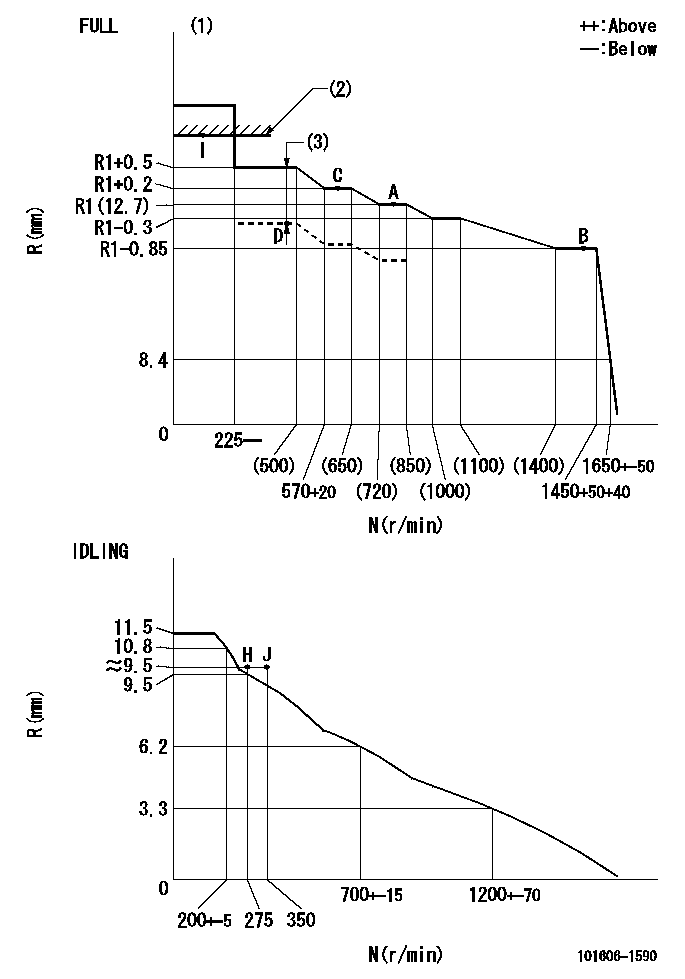
N:Pump speed
R:Rack position (mm)
(1)Torque cam stamping: T1
(2)RACK LIMIT
(3)Boost compensator stroke: BCL
----------
T1=C86 BCL=0.9+-0.1mm
----------
----------
T1=C86 BCL=0.9+-0.1mm
----------
Timer adjustment

(1)Adjusting range
(2)Step response time
(N): Speed of the pump
(L): Load
(theta) Advance angle
(Srd1) Step response time 1
(Srd2) Step response time 2
1. Adjusting conditions for the variable timer
(1)Adjust the clearance between the pickup and the protrusion to L.
----------
L=1.5+-0.2mm N2=800r/min C3=(8deg) t1=2--sec. t2=2--sec.
----------
N1=1400r/min P1=0kPa(0kgf/cm2) P2=392kPa(4kgf/cm2) C1=0.5--deg C2=8+-0.3deg R01=0/4load R02=4/4load
----------
L=1.5+-0.2mm N2=800r/min C3=(8deg) t1=2--sec. t2=2--sec.
----------
N1=1400r/min P1=0kPa(0kgf/cm2) P2=392kPa(4kgf/cm2) C1=0.5--deg C2=8+-0.3deg R01=0/4load R02=4/4load
Speed control lever angle
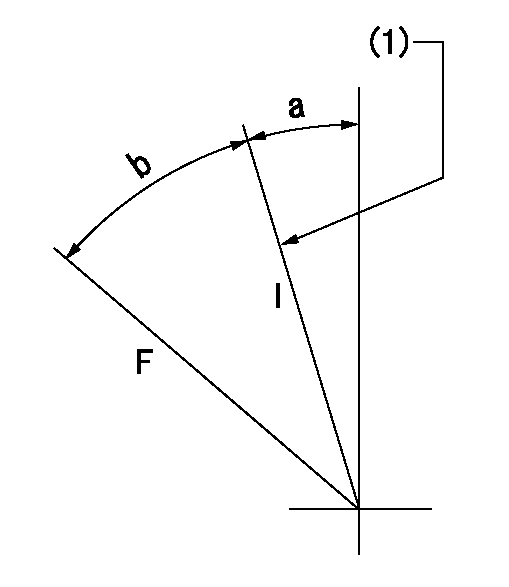
F:Full speed
I:Idle
(1)Stopper bolt set position 'H'
----------
----------
a=18.5deg+-5deg b=39deg+-3deg
----------
----------
a=18.5deg+-5deg b=39deg+-3deg
Stop lever angle
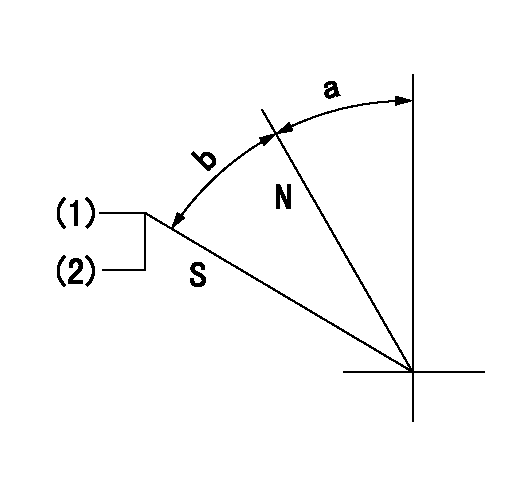
N:Pump normal
S:Stop the pump.
(1)Set the stopper bolt at speed = rated point and rack position = aa (non-injection rack position). Confirm non-injection.
(2)After setting the stopper bolt , confirm non-injection at pump speed bb. Rack position = cc (non-injection rack position).
----------
aa=(6.5)mm bb=275r/min cc=(6.5)mm
----------
a=11.5deg+-5deg b=(27deg)+-5deg
----------
aa=(6.5)mm bb=275r/min cc=(6.5)mm
----------
a=11.5deg+-5deg b=(27deg)+-5deg
0000001501 MICRO SWITCH
Adjustment of the micro-switch
Adjust the bolt to obtain the following lever position when the micro-switch is ON.
(1)Speed N1
(2)Rack position Ra
----------
N1=400+-5r/min Ra=9.2mm
----------
----------
N1=400+-5r/min Ra=9.2mm
----------
0000001601 RACK SENSOR
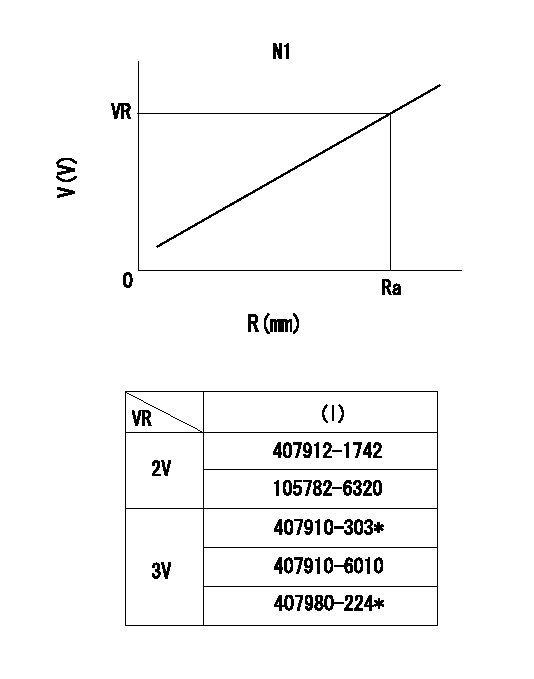
R:Rack position (mm)
V:Voltage (V)
After installing the rack sensor, confirm the output value (VR).
----------
N1=800r/min Ra=R1(12.7)mm VR=1.99+-0.01V
----------
----------
N1=800r/min Ra=R1(12.7)mm VR=1.99+-0.01V
----------
Timing setting
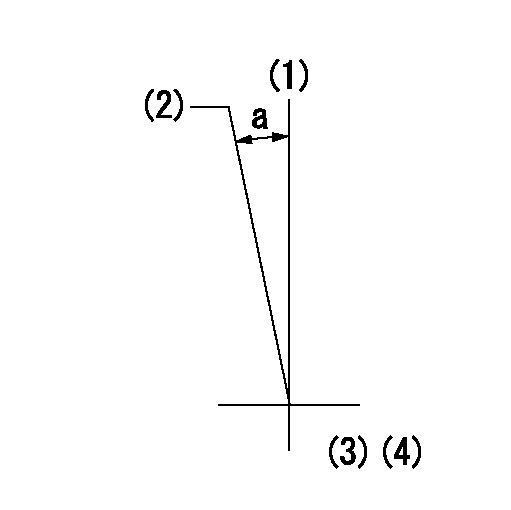
(1)Pump vertical direction
(2)Position of timer's tooth at No 1 cylinder's beginning of injection
(3)B.T.D.C.: aa
(4)-
----------
aa=11deg
----------
a=(1deg)
----------
aa=11deg
----------
a=(1deg)
Information:
Torque for Standard Bolts, Nuts and Taperlock Studs
The following charts give general torques for bolts, nuts, and taperlock studs. For torque specifications not included in this section, refer to Torque Specifications, SENR3130, available from your Caterpillar dealer.
Torques for Bolts and Nuts With Standard Threads
Torques for Taperlock Studs
Use these standard torque values for all fasteners, unless otherwise specified in this manual or in the Service Manual.Torque for Metric Fasteners
Be very careful never to mix metric with customary (SAE standard) fasteners. Mismatched or incorrect fasteners will cause engine damage or malfunction and may even result in personal injury.Original fasteners removed from the engine should be saved for reassembly whenever possible. If new fasteners are needed, they must be of the same size and grade as the ones that are being replaced.
Material strength identification is usually shown on the bolt head by numbers (8.8, 10.9, etc.). The following chart gives general torque values for bolts and nuts. Use these standard torque values unless otherwise specified in this publication. Metric hardware must be replaced with metric hardware. Check Parts Manual for proper replacement.Torques for Bolts and Nuts with Metric Threads
Torque for Standard Hose Clamps-Worm Drive Band Type
The following chart gives the torques for initial installation of hose clamps on new hose and for reassembly or tightening of hose clamps on existing hose. Torque for Constant Torque Hose Clamps
Due to extreme temperature changes, hose will heat set. Heat settings causes hose clamps to loosen. Loose hose clamps can result in leaks. There have been reports of component failures caused by hose clamps loosening. The new constant torque hose clamp will help prevent these failures. A constant torque hose clamp can be used in place of any standard hose clamp. Make sure the constant torque hose clamp is the same size as the standard clamp.
Installation
Each installation application can be different depending on the type of hose, fitting material, and anticipated expansion or contraction of the hose and fittings. A torque wrench should be used for proper installation of constant torque hose clamps. Constant torque hose clamps should be installed as follows:* To allow for maximum expansion, install clamps at 5.7 N m (50 lb in).* To allow for equal expansion and contraction, install clamps at 10.2 N m (90 lb in).* To allow for maximum contraction, install clamps at 14.1 N m (125 lb in).
The following charts give general torques for bolts, nuts, and taperlock studs. For torque specifications not included in this section, refer to Torque Specifications, SENR3130, available from your Caterpillar dealer.
Torques for Bolts and Nuts With Standard Threads
Torques for Taperlock Studs
Use these standard torque values for all fasteners, unless otherwise specified in this manual or in the Service Manual.Torque for Metric Fasteners
Be very careful never to mix metric with customary (SAE standard) fasteners. Mismatched or incorrect fasteners will cause engine damage or malfunction and may even result in personal injury.Original fasteners removed from the engine should be saved for reassembly whenever possible. If new fasteners are needed, they must be of the same size and grade as the ones that are being replaced.
Material strength identification is usually shown on the bolt head by numbers (8.8, 10.9, etc.). The following chart gives general torque values for bolts and nuts. Use these standard torque values unless otherwise specified in this publication. Metric hardware must be replaced with metric hardware. Check Parts Manual for proper replacement.Torques for Bolts and Nuts with Metric Threads
Torque for Standard Hose Clamps-Worm Drive Band Type
The following chart gives the torques for initial installation of hose clamps on new hose and for reassembly or tightening of hose clamps on existing hose. Torque for Constant Torque Hose Clamps
Due to extreme temperature changes, hose will heat set. Heat settings causes hose clamps to loosen. Loose hose clamps can result in leaks. There have been reports of component failures caused by hose clamps loosening. The new constant torque hose clamp will help prevent these failures. A constant torque hose clamp can be used in place of any standard hose clamp. Make sure the constant torque hose clamp is the same size as the standard clamp.
Installation
Each installation application can be different depending on the type of hose, fitting material, and anticipated expansion or contraction of the hose and fittings. A torque wrench should be used for proper installation of constant torque hose clamps. Constant torque hose clamps should be installed as follows:* To allow for maximum expansion, install clamps at 5.7 N m (50 lb in).* To allow for equal expansion and contraction, install clamps at 10.2 N m (90 lb in).* To allow for maximum contraction, install clamps at 14.1 N m (125 lb in).